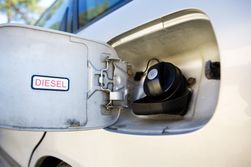What's the Difference Between Gasoline & Diesel Fuel?

Gasoline and Diesel Fuel are two of the most-used propellants for motor engines. While both are derived from crude oil, how they work inside a motor differs significantly. As such, putting the wrong type of fuel into the tank can result in costly repairs and extensive damage to the engine. Here are a few tips to understand why that happens.
How Gasoline & Diesel Fuel Vary
The primary difference between these two is the refinement process. Crude oil contains many types of hydrocarbons—molecules with hydrogen and carbon—with impurities like sulfur, nitrogen, oxygen, water, and inorganic salts mixed in as well. Separating the hydrocarbons from each other requires heating the oil at different boiling points, thus refining it to produce various petroleum products.
Longer hydrocarbon chains have higher boiling points and are extracted through the process called fractional distillation. In a distillation column where the crude oil is heated, each different chain is pulled out according to its vaporization temperatures. Petrol, or gasoline, is a mix of alkanes and cycloalkanes with five to 12 carbon atoms while diesel fuel has a longer chain of alkanes with 12 or more carbon atoms. That’s why diesel can only be derived at boiling temperatures of 250 to 350 degrees Celsius, which is higher than gasoline’s range of 40 to 205 degrees Celsius.
The higher boiling point of diesel fuel means that it won’t evaporate as fast as gasoline will, even at room temperature. Diesel is also denser relative to gasoline, allowing it to generate more power when it combusts, and produces around 15% more energy by volume. However, it needs compression and heat to burn, whereas gasoline only requires a spark to ignite.
Why Using the Wrong Fuel Can Be Disastrous
 Diesel- and Gasoline-powered engines are built differently because of the different combustion process that transforms fuel into mechanical energy. The combustion, or series of explosions inside the engine, is triggered in two ways, depending on the fuel used.
Diesel- and Gasoline-powered engines are built differently because of the different combustion process that transforms fuel into mechanical energy. The combustion, or series of explosions inside the engine, is triggered in two ways, depending on the fuel used.
In a diesel engine, the air is compressed first at high pressure to heat up and ignite the injected fuel. A gasoline engine, on the other hand, requires less air pressure and lower heat and depends on the spark plugs to burn the gasoline. They have vastly different components, construction, and air-fuel and compression ratios, so refilling your fuel tank with the wrong type can lead to extensive engine damage, especially with prolonged use. Loss of compression from the damaged piston or cylinder heads and deposit buildup on the valves are some of the worst repercussions of this oversight.
If you want to learn more about how diesel fuel and gasoline differ, ask the experts at Bradigan's Incorporated in Kittanning, PA. In business since 1952, they’ve provided premium-quality petroleum products, including heating oil, motor oil, and non-ethanol gasoline, to homes and businesses throughout Armstrong County and nearby areas. Call (724) 548-7654 to schedule a delivery or view their petroleum products online.
About the Business
Have a question? Ask the experts!
Send your question

